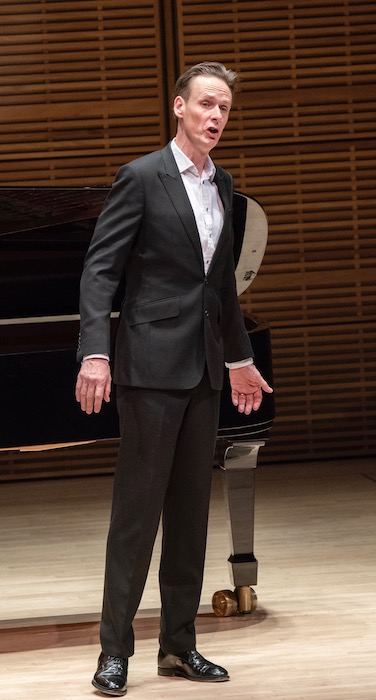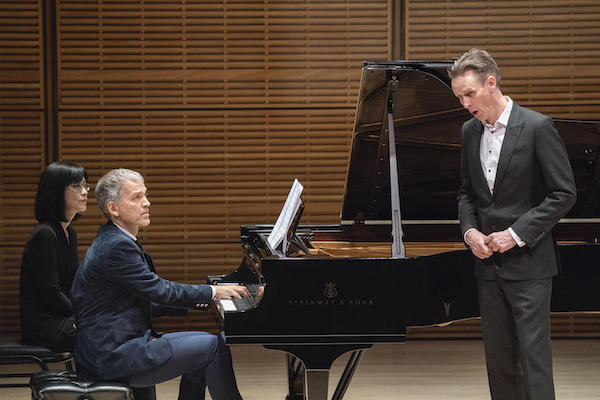Bostridge, Mehldau partner in memorable night of song cycles old and new

It was a rare quiet night up in the main auditorium of Carnegie Hall on Thursday night. Downstairs in Zankel, Ian Bostridge and Brad Mehldau gave an extraordinary recital, one of the highlights of the season in New York.
In a literary sense, the two works on Thursday’s program were close parallels, with the excruciating longing of Schumann’s Dichterliebe reflected in the New York premiere of Mehldau’s own original work, The Folly of Desire. Mehldau’s eleven-song cycle incorporates verse by major English poets from Shakespeare to Cummings—save for a single poem by Berthold Brecht—that explore many facets of romantic love, expressing its intensity of feeling and often uncomfortable obsession in fascinating settings that dance around a crushed, claustrophobic tonality.
Mehldau’s cycle opens with William Blake, a setting of “The Sick Rose” whose accompaniment seems to hide an unsettling mystery under its almost lounge-like nonchalance. The vocal line turns dark more explicitly, implying what feels like a threat as it sings that the parasite “Has found out thy bed / Of crimson joy.” Another song that treats the relationship of illness and the erotic, Shakespeare’s Sonnet 147 (“My love is as a fever”), creates stifling heat with its languid stepwise melody.
The setting of Brecht’s “Über die Verführung von Engeln” (“On the Seduction of an Angel”) sets up a contrast between text and music; the tenor delivers the verse—so raunchy that Brecht’s estate apparently forbids the printing of a translation—with almost clinical detachment (Bostridge began the performance by reading one from his phone). At the same time the piano plays with rhythmic sweetness and glassy, dissonant tonality, rather like Schumann reflected on a murky surface.
Mehldau shows a sense of humor in his treatment of Cummings’s “the boys I mean are not refined,” giving the piano a driving rock-and-roll beat to start, before transforming the same figure into a softer, more nuanced pulse almost like a parody of a Schubert lied. A brief excerpt from Yeats’s “Sailing to Byzantium” is a picture of calm, as the piano offers just a few deliberate chords between phrases of the tenor’s sun-kissed melody.
Closing the cycle is a moving setting of Auden’s “Lullaby.” The music shows a bit more angst than its title might suggest, as harmonic tension intrudes into an eerily hypnotic melody whose first arching turn bears a striking resemblance to “When You Wish Upon a Star.”
The Dichterliebe that followed intermission was a little disorienting, at first. For this performance, Bostridge and Mehldau used an edition that included four songs Schumann originally composed for the cycle but omitted from the first published edition, all on the front end. To a listener familiar with the standard version of the cycle, not hearing the iconic opening strain of “Im wunderschönen Monat Mai” until the fifth song is a bewildering experience.
It was an interesting novelty to hear these four songs restored, and “Dein Angesicht,” the first, is hauntingly lovely. Yet on the whole, it’s clear why these four were cut before publication: “Mein Wagen rollet langsam,” though it features ingenious melding of voices in the piano, suffers from a slapdash fit between text and music. A pronounced pause after the fourth of these only underscored the feeling of detachment from the rest of the cycle.

But in the more familiar body of the work, this performance was nothing less than transporting—rich in expression and meaning, diving into the deep emotions of the cycle. This perennial staple of the lieder repertoire has never felt more fresh.
It’s hard for anything not to feel fresh when performed by an artist as engaged as Ian Bostridge. He is such an emotive singer, he reacts to the music with his whole body, even when the piano is playing alone. In the cycle’s final song, “Die alten, bösen Lieder,” as he sang of burying his sorrows in a coffin, it looked as if he might climb into the piano and close the lid on himself, overcome as he was with grief.
Yet Bostridge is an intellectual singer as well, and he brings to his interpretations a rich understanding of the text. He relishes every word, giving each direction as though he has a destination in mind for every note.
Mehldau’s playing was no less impressive and every bit as evocative as Bostridge’s singing. He brought natural fluidity and freedom to “Im Rhein, im heiligen Strome,” and created a whirl of rage in “Das ist ein Flöten und Geigen,” like a dancer being dragged around the floor in a mad waltz.
Whether blending or contrasting with each other, the two combined to create rich interpretations of every song. In their sublime rendition of “Im wunderschönen Monat Mai,” Mehldau’s playing was arrow-straight, offering a music-box simplicity as a counterpoise to the intense feeling of Bostridge’s poetic declamation. “Die Rose, die Lilie, die Taube, die Sonne” came as a burst of obsessive passion, rolling out in a torrent.
The seemingly joyful bounce of “Ein Jüngling liebt ein Mädchen” was drenched in acid, the pianist mocking the singer’s anguish with his smiling dance. “Am leuchtenden Sommermorgen” balanced right on the edge of bliss and grief, as both performers achieved a rapturous, soft glow.
Most memorable of all was “Ich grolle nicht,” where Mehldau delivered the piano part with a majestic sense of space, while Bostridge sang as though struggling to contain emotion that constantly threatened to burst through the melody. A strain on the top note was the only blemish on an evening in which the tenor was in superb voice, finding an exceptional richness of tone to complement his characteristic beaming purity.
For three brilliant encores, Bostridge, the great interpreter of German lyric song, transformed into a masterful cabaret singer. Both performers showed a natural feel for the sultry, jazzy style of Noël Coward’s “Twentieth Century Blues” (cheekily updated to the twenty-first). A sentimental rendition of Cole Porter’s “Ev’ry time we say goodbye” was maybe a touch overdone, but it was made up for by a hair-raising performance of the classic “These foolish things” by Eric Maschwitz and Jack Strachey, in which Mehldau channeled wry humor in his improvisation and Bostridge oozed sensuality.


